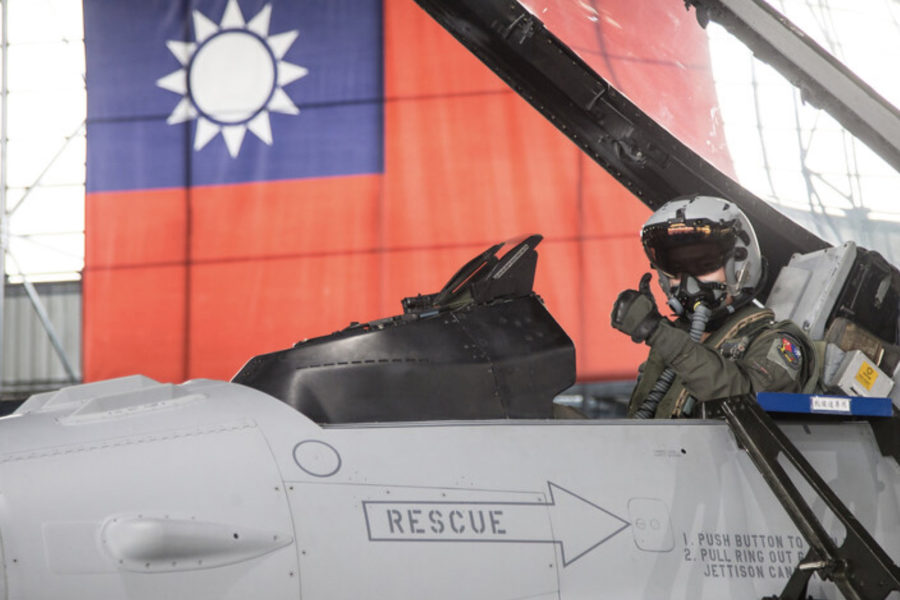There is “high risk” to the plans for supplying Taiwan with new and modified F-16s in a timely way, according to 24 Republican members of the House of Representatives, who called on Air Force Secretary Frank Kendall to accelerate delivery of the fighters and upgrade kits in a letter released sent last week.
“While the FMS [Foreign Military Sales] case was supposed to be completed by 2025-2026, the estimated delivery timeline slipped earlier this year to 2026-2027,” noted the two dozen lawmakers, whose ranks include Rep. Rob Wittman (R-Va.), chair of the influential House Armed Services tactical air and land forces subcommittee, and more than half of the Republicans on the HASC.
While there have been some improvements in getting the program on track, “we still consider these F-16 FMS cases to be high risk,” the lawmakers wrote. “As such, we will continue to monitor these efforts closely, especially related to organizing, staffing, funding, and prioritizing the delivery and ferry flight operations supporting a timely arrival on the island of 66 new F-16 aircraft.”
The upgrade of Taiwan’s F-16 fleet includes upgrading the island’s 141 1990s-vintage F-16A/B Block 30s to F-16 Block 70-72 configuration aircraft, along with the purchase of 66 new-build F-16V models.
Asked for comment, an Air Force spokesperson said “the Department of the Air Force will provide an update directly to the congressional members.”
F-16 maker Lockheed Martin is “grateful for the trust Taiwan has placed in us across its F-16 program,” a spokesperson said. “In partnership with the U.S. government, Lockheed Martin is focused on developing F-16 capabilities in support of U.S. security cooperation objectives.”
Lockheed Martin is partnered with Taiwan’s Aerospace Industrial Development Corp. to perform the upgrades in-country. The upgrades include new AN/APG-83 active electronically-scanned-array radars, new electronic warfare kit, structural improvements, new mission computers, datalinks, and a helmet-mounted cuing system, along with additional types of weapons. The new “Viper” version aircraft are being built at Lockheed’s Greenville, S.C., F-16 production and refit center.
The first upgraded F-16 entered Taiwanese service in 2018, and initial operational capability with the type is expected later this month. The F-16V deal, signed in 2019, is worth approximately $8 billion.
“We recognize that these FMS cases were impacted from their earliest inception by optimistic assumptions about how rapidly new technology and modifications might be integrated into the initial F-16 design,” the members said. “Taiwan urgently needs these new and upgraded aircraft, and a stronger, more resilient Taiwan will improve stability across the Taiwan Strait.”
The members said they’re ready to work with Kendall to ensure the two FMS cases are not further delayed and they “hope to prevent similarly optimistic technology assumptions from manifesting in the future. We cannot afford to over-promise and under-deliver to our closest friends.”
The lawmakers applauded “several efforts undertaken by the Air Force and Taiwan that are effectively improving these F-16 FMS case timelines.” These include a “spiral development approach” that will shorten delays for the F-16 Block 70/72 aircraft, “enabled by the production line rightly prioritizing Taiwan aircraft,” the letter said.
“We are also encouraged by the steps taken by the Air Force to drastically reduce schedule risk for the F-16V retrofit program due to the on-time delivery of parts,” they wrote.
In May, Taiwanese officials said that F-16V deliveries would slip from 2023 to 2024, due to parts shortages and supply chain issues. The Air Force said at the time that parts shortages were also a result of increasing demand for defense systems worldwide.
The current estimate is that the 66 F-16Vs will all be delivered to Taiwan by the end of 2026.
The F-16 Block 70/72 refit “had been delayed by over 15 months due to software development complexities not anticipated by the original equipment manufacturer,” the lawmakers noted. “These are critical programs to improve Taiwan’s self-defense capabilities in the near- to mid-terms.”
In their letter, the members noted that the People’s Republic of China sent 1,737 aircraft into Taiwan’s air defense identification zone in 2022, and the provocations have only increased in 2023.
This “is not an aberration—the Chinese Communist Party is mounting an increasingly aggressive pressure campaign against the island that continues to intensify,” they wrote.
Taiwan needs the new aircraft to replace F-5E/F aircraft that are no longer up to the job, they added.
“We respectfully request that you provide a written update on the overall schedule for both F-16V upgrades and production of all F-16 Block 70/72 aircraft by Dec. 18, 2023, to inform our oversight activities in the second session of the 118th Congress,” the members wrote.
“We stand ready to work with you to resolve these setbacks and improve the defense of Taiwan.”
The signatories included:
- Robert J. Wittman (Va.)
- Mark Alford (Mo.)
- Joe Wilson (S.C.)
- Jake LaTurner (Kan.)
- Ronny L. Jackson (Tex.)
- William R. Timmons (S.C.)
- Ann Wagner (Mo.)
- Michael Waltz (Fla.)
- James C. Moylan (Guam)
- Carlos A. Gimenez (Fla.)
- Robert B. Aderholt (Ala.)
- Ryan K. Zinke (Mont.)
- Rich McCormick, (Ga.)
- Austin Scott (Ga.)
- Lance Gooden (Tex.)
- Bill Johnson (Ohio)
- John R. Carter (Texas)
- August Pfluger (Texas)
- Thomas H. Kean, Jr. (N.J.)
- Michael R. Turner (Ohio)
- Don Bacon (Neb.)
- Jen A. Kiggans (Va.)
- Brad Finstad (Minn.)
- Mike Gallagher (Wisc.)
